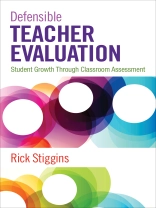Meaningful teacher evaluation starts with visible student growth
Annual standardized test scores cannot provide evidence of student growth needed to evaluate teacher performance. But consider student growth in the form of evidence derived from classroom assessment and you’re on to something. For assessment expert Rick Stiggins, this can form the basis for a truly productive teacher evaluation strategy.
This revolutionary book helps you bring classroom assessment to bear for real school improvement, with
- A plan for teacher evaluation based, in part, on dependable evidence of student growth
- Strategies for improving the assessment literacy of teachers and school leaders
- Five steps for developing and implementing productive local district assessment systems
- Practical tools that teachers and their evaluators can put to use immediately
In this era of aggressive teacher evaluation reform, where teachers are charged with preparing ALL students to master 21st century proficiencies, the measurement of teacher success must start where learning happens—in the classroom.
‘Developing a fair, practical, and effective teacher evaluation system is like climbing a high mountain: it’s impossible until someone finds a route. That’s what Rick does in this book. He identifies the immense challenges associated with using evidence on student learning as the principal criteria in teacher evaluation and then offers practical guidance for overcoming those challenges. He hasn’t made the climb easy, but he shows us the way.’
—Thomas R. Guskey, Professor of Educational Psychology
University of Kentucky
‘Rick Stiggins builds a compelling case for the development of a solid foundation of assessment competence throughout our educational system.’
—Linda Darling-Hammond, Charles E. Ducommun Professor of Education
Stanford University
Tabela de Conteúdo
1. Keys to Productive Teacher Evaluation in the New Era
2. Annual Accountability Test Score? Unacceptable in This Case
3. Classroom Assessment to the Rescue
4. Similar to Student Learning Objectives, But Much Better
5. Tapping the Power of Universal Assessment Literacy
6. Required: Local School Leadership and Assessment Action
Appendix A: Classroom Assessment Quality Rating Scales
Appendix B: Sample Affective Questionnaires
Appendix C: Rating Scales for Evaluating Completion of Five Essential Local Assessment Actions
Sobre o autor
Rick Stiggins has devoted his professional life to understanding keys to student academic success in the classroom. His mission has been to help teachers, school leaders, policy makers, and school communities apply research-based policies and classroom practices that help all students experience the highest-possible levels of learning success.His preparation to fulfill this mission began as a psychology major at the State University of New York at Plattsburgh, followed by doctoral studies in educational psychology at Michigan State University. Rick’s focus on keys to student success was sharpened with early career experiences at the University of Minnesota, on the research staff of the Northwest Regional Educational Laboratory (NWREL) in Portland, Oregon, and as a visiting scholar at Stanford University. During this phase of his own development, Rick spent over a decade in classrooms with students and teachers researching and striving to understand (1) the task demands teachers face in managing the day-to-day classroom assessment process, and (2) how that process can positively impact students’ motivation, actions, and achievement, as well as their sense of themselves as learners.With this foundation of understanding in hand, Rick founded the Assessment Training Institute (ATI) in 1992 in Portland, a professional development company whose mission was to promote the “assessment literacy.” He and his team developed and disseminated print, video, and online offerings that help educators, parents, and school communities in general learn to gather dependable evidence of student achievement and use that evidence effectively to develop truly effective instructional practices. Rick and the ATI team turned the spotlight onto the breakthrough practice of using “assessment for learning” or of engaging students in ongoing self-monitoring and management of their own growth while it is happening.Primary among the materials Rick and his team created has been an award-winning professional text for teachers titled An Introduction to Student-Involved Assessment for Learning, now available in its seventh edition (Chappuis & Stiggins, 2017). In addition, he has authored numerous books, articles, and other writings on sound practice for pre- and in-service training, community outreach, and educational leadership that have helped literally hundreds of thousands of teachers, school leaders, and community leaders around the world improve their classroom practice, educational leadership capabilities, and professional confidence. Through these channels, it is safe to assume that Rick’s work has impacted the learning and self-confidence of millions of students over the past forty years.












